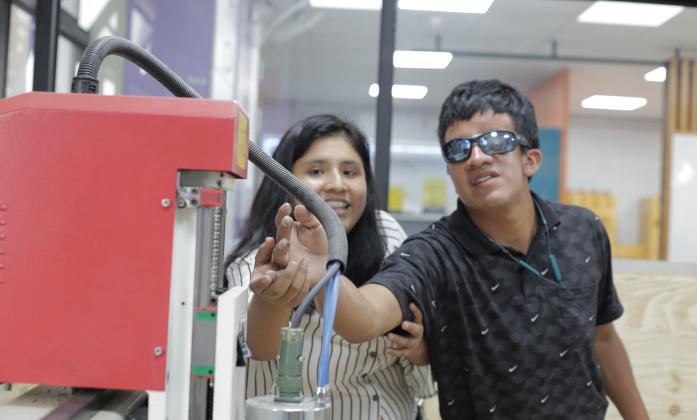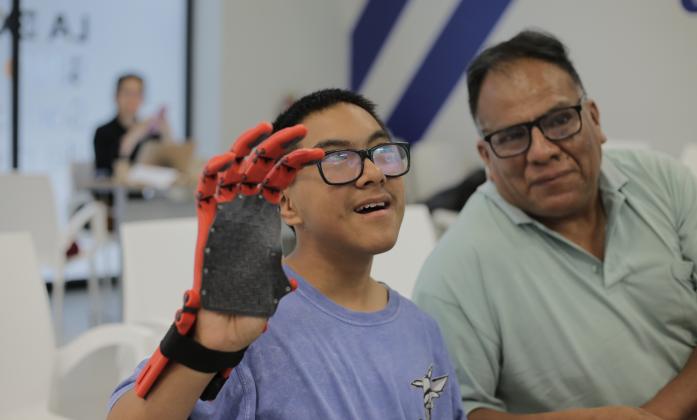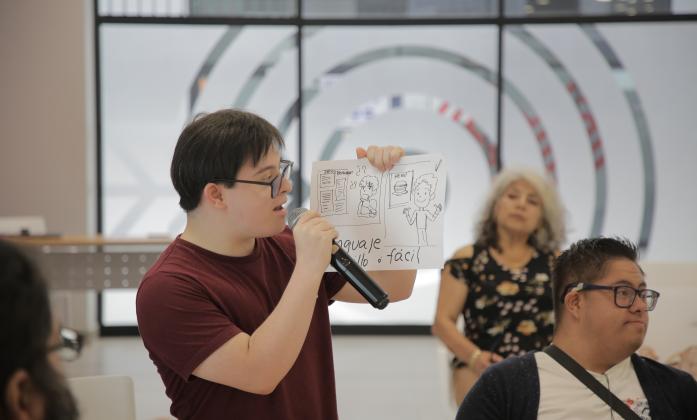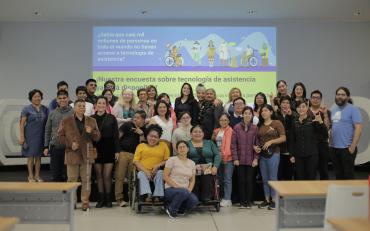Insights from the AT Workshop and GDS Consultations held in Lima, Peru, in December 2023
The Universidad Continental in Lima, Peru, hosted an Assistive Technology Workshop last December 18th and 19th that showcased the transformative power of assistive technology for persons with disabilities. The event, organized by the International Disability Alliance (IDA) and the Global Disability Innovation Hub (GDI Hub), aimed to strengthen capacities of Organizations of Persons with Disabilities (OPDs) in assistive technology and to highlight the importance of persons with disabilities participating in the design, delivery and policymaking related to assistive technology.
The Significance of Assistive Technology: Representatives from OPDs drove the discussion about the potential of AT in everyday life. Speaking on the critical role of AT, Rosa Maria Juarez from RIADIS (Latin American Network of Non-Governmental Organizations of Persons with Disabilities and their Families) described its potential to empower persons with disabilities to function independently and promote their equal participation in society. Describing assistive technology as a human right, Juarez addressed the need for bridging the access gaps that exist between persons with disabilities and good quality AT.
Supporting Inclusion in the University Environment: Co-hosted by the Universidad Continental (UC) and IDA, this workshop presented a unique platform for recognizing the role played by AT in inclusive education. Lourdes Suasnabar from the Universidad Continental highlighted the work of the Inclusion Unit at the UC. This unit provides support to students with disabilities, starting with during their application process, continuing to the duration of their studies. Recognizing the significance of this support, the unit strives to ensure that no student is left behind when pursuing higher education. UC also showcased their FabLab, or Digital Fabrication Laboratory, during the workshop. The FabLab utilizes advanced technologies such as 3D printing to create accessible prosthetics. Participants took a tour of the facilities and witness firsthand the fabrication process of these innovative products.
The Yachay Project: Revolutionizing Education: Another notable initiative presented during the workshop was the Yachay Project. This project aims to create an intelligent system of portable profiles and portfolios for education across Latin America and the Caribbean. that will facilitate the implementation of 21st-century educational requirements, providing students with personalized, accessible, and technology-driven learning experiences.

Exploring Assistive Technology and its Applications
Elizabeth Campos, IDA Assistive Technology Fellow, shared practical examples of how assistive technology, such as voice-controlled devices and pointer systems can assist persons with physical disabilities. Her session also highlighted regulatory frameworks in the form of specific laws and policies aimed at improving access to assistive technology in Peru. One barrier discussed was the requirement for assistive products to be prescribed by a physician, which can hinder timely access for those in need. The intended users of assistive technologies include persons with disabilities, the elderly, persons with communicable and non-communicable diseases, and those with mental health conditions or functional decline.
The AAAAQ framework, presented by Rosario Galarza, IDA’s Senior Help Desk Officer, stands for availability, accessibility, adaptability, acceptability, and quality. During the session, questions were raised about the inclusion of persons with disabilities during the processes of design and development of AT. The discussions reinforced the importance of consulting OPDs during these processes, alongside the process of assessing AT using the AAAAQ framework. During subsequent group discussions, participants identified various challenges related to the availability, accessibility, adaptability, acceptability, and quality of AT in Peru.

The IDA-GDI Hub Assistive Technology Survey
Camila Petzoldt, IDA’s Senior MEAL Officer, presented the IDA-GDI Hub Assistive Technology Survey to the participants. The survey aims to gather valuable insights into the usage and availability of assistive technology worldwide, as well as identify the key barriers faced by persons with disabilities in accessing these technologies. The survey results will serve as an important advocacy tool at both the international and national levels, with the potential to drive positive change and improve the accessibility of assistive technology. IDA staff also supported participants with completing the survey to ensure that the voices and experiences of persons with disabilities in Peru are captured and reflected in the final report.
The survey is available in English, Spanish, French, and Arabic. It is also available in international sign, as well in an easy-read format.
The survey will be available on the iData Survey Platform until February 15th, 2024, so there is still time for persons to participate and contribute to this initiative!
Fill out the IDA-GDI Hub Survey on Assistive Technology

Building a Portfolio of Countries for Investment in Assistive Technology
Luz Mari Vargas, representing Consejo Nacional de Discapacidad (CONADIS), presented their project titled Building a Portfolio of Countries for Investment in Assistive Technology. This initiative aims to assess the current state of assistive technology in Peru and develop a roadmap for investment in this field. The project was developed in collaboration with international agencies and governments has only been implemented in three countries so far, with Peru being the sole representative from Latin America. The phases of the project include strengthening political will, diagnosing barriers to AT access, and forming a multisectoral technical team to build a roadmap towards AT access for all. This project has the potential to shape the global assistive technology landscape and make a significant impact on the lives of millions of people worldwide.
The Global Disability Summit Consultation: Advocating for Disability-Inclusive Development.
The next edition of the Global Disability Summit (GDS) is to be held in Berlin in 2025. IDA has prioritized the inclusion of GDS consultations during its capacity building events. Rosario Galarza of the IDA Secretariat guided the consultation, the first-ever of its kind held in Peru. During group discussions, participants identified several thematic priorities for the GDS 2025, Berlin, including accessibility, housing, education, employment, and inclusive events. By addressing these priorities, the summit can drive tangible change and create opportunities for persons with disabilities to thrive in Peru.
In conclusion, the workshop acted as a platform for meaningful conversation about AT across diverse streams, such as disability inclusion in educational institutions, advocating for disability-inclusive development on a global scale, and the urgent need to invest in AT research. OPD representatives collaborated on actionable steps for breaking down accessibility barriers and recommended that rigorous assessment of AT will pave the way for true inclusivity and empowerment for persons with disabilities.
To download this blog in Spanish, click here.

